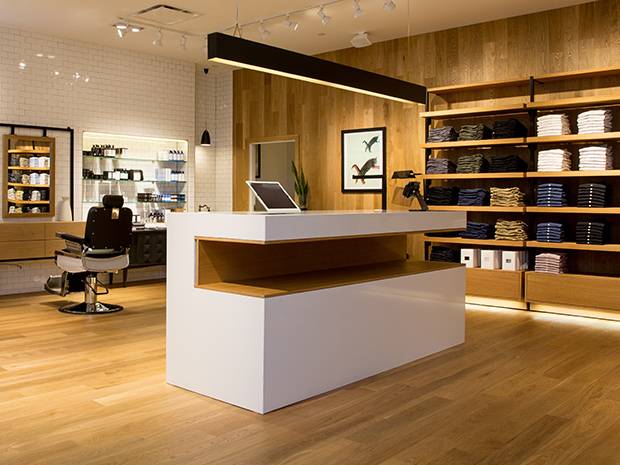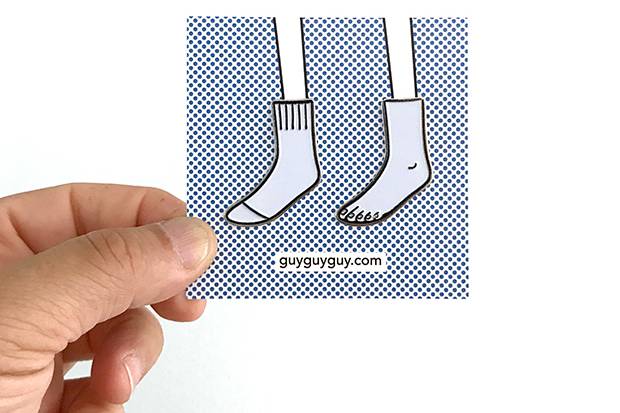Roman Hessary was working at TD Securities in a job he felt indifferent about making close to $100,000 a year when he decided to quit to join his best friend in the fashion business. Hessary and Yanal Dhailieh, who worked in corporate sales at the time, have been friends since elementary school. They had attempted to go down the start up path before with little success, but they remained committed to the idea of escaping the corporate rat race to work for themselves in a creative industry.
In 2015, the business partners launched Peace Collective, a line of apparel and housewares emblazoned with patriotic slogans, in Toronto. "We were buying shirts from American Apparel and printing them on Queen Street at Bang-On, really making no money, but just trying to prove that there is a business," says Hessary. Though he continued to work at TD for another year, Hessary credits Dhailieh's early full time commitment to the brand as their biggest turning point (the partners also have baseball player José Bautista and the Blue Jays to thank after they sported their "Toronto vs. Everybody" slogan t-shirts). Soon, Hessary and Dhailieh were joined by another ex-bank employee, Lisa Diep, as their head of strategy. "Because all of us have backgrounds that have nothing to do with fashion, we do things our own way," Dhailieh says. "A lot of the time that means a lot of mistakes, but we also don't follow any set path."
The Peace Collective team isn't alone when it comes to entrepreneurs migrating to the fashion world from finance. But while leveraging professional experience in everything from accounting to engineering can help a start up avoid the pitfalls that come with launching a new business, also meeting the creative needs of a fashion brand can be an unexpected challenge.

A Frank & Oak boutique in Montreal.
Ethan Song and Hicham Ratnani studied engineering and worked together at consulting behemoth Deloitte before leaving to start Montreal-based retailer Frank + Oak in 2009. "We identified a real need that our customers had," says Song. "We've always had a very data and technology driven approach to our commerce and that definitely comes from my engineering background." As a result of their skill set, Frank + Oak now operates 15 physical locations in North America that are integrated with a robust website that offers 24-hour customer assistance and the ability to book in-person appointments with the stylists and barbers that work out of its stores. "Seeing how big businesses run themselves helped us shape what we need to do to scale the business and the challenges we should expect at different sizes," says Song.
Not everyone who chooses to dip their toe into the fashion world abandons their first career. Guy Anderson, a copywriter who works in medical and healthcare advertising by day, started his Etsy store GuyGuyGuy a little over a year ago. He had initially moved to Toronto for design school but quickly found that sewing was not his strong suit. So, in 2011, he got a "real job" with a touch of creativity. "It seemed really hard to make a living as a designer," Anderson says.

A Guy Anderson pin.
Inspired by other Toronto-based brands like No Fun Press and Rosehound Apparel, Anderson eventually decided to launch his line of pins, patches, totes and shirts featuring his tongue-in-cheek line drawings in May 2016. Anderson's products are now sold at boutiques in Canada, the United States, and as far away as Singapore. Sometimes, his friends will come over to his apartment, which doubles as his studio, to package pins for shipment in exchange for free pizza. "A typical day is: work all day, then come home and work some more," he says. "I do get to be creative [at work] and it's awesome, but you're working for somebody else. I wanted to have my outlet where I could do my own thing and create on my own terms."
But despite the creative allure of the fashion industry, many who make the transition from other professions inevitably learn that its more glamorous aspects aren't always a priority. At Peace Collective, Dhailieh's design responsibilities have mostly been handed off to others as the company and its managerial needs have expanded. Excelling in fashion comes from balancing success in the design studio and the boardroom, after all.
Visit tgam.ca/newsletters to sign up for the Globe Style e-newsletter, your weekly digital guide to the players and trends influencing fashion, design and entertaining, plus shopping tips and inspiration for living well. And follow Globe Style on Instagram @globestyle.